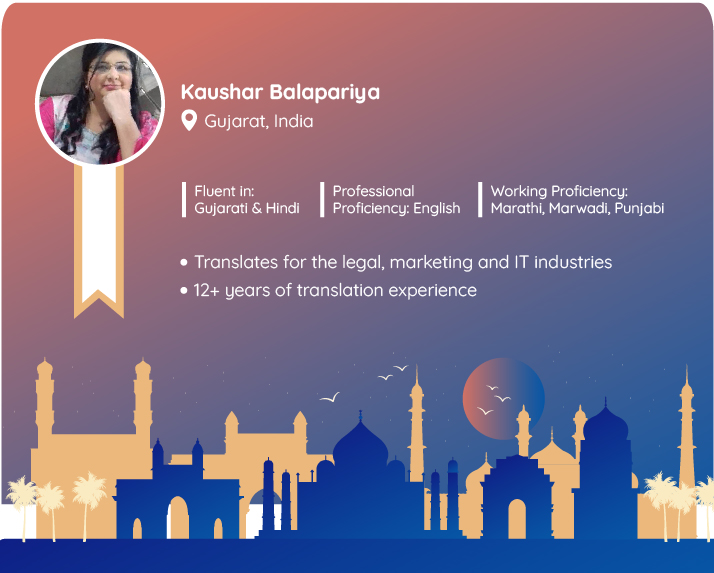
A career in translation and localisation is usually a conscious choice for most of our translators. But what happens when someone stumbles upon this field by chance? Wonderful things.
This translator interview is centred around the life and experiences of Kaushar Balapariya, a strong and empowered lady who also happens to be an ace translator. She translates various texts from English into her native language, Gujarati and Hindi. Her story is extremely inspiring, and we’re glad she’s here to share it with us today.
Read on as Kaushar tells us how the world of translation helped her through her darkest hour and onto a journey of independence, self-healing, and happiness!
Hi Kaushar, thanks for being a part of our interview. Please share your story with us so we can get to know you a little better.
Hello, thank you for interviewing me! I believe in absolute transparency and would like to share my story, which is full of struggle, hard work, disappointment, and even depression. Luckily, I am now happy and well-settled. My struggle started when I was 18 years old and got married. Unfortunately, I was abused, humiliated, and beaten on the second day of marriage in the name of dowry. This continued for months. During that time, I became pregnant and gave birth to a baby boy. One day, my husband hurt our 4-month-old son. That night, I gathered courage and left him with our son to start a new life.
Wow, that must have been a very difficult time for you, but you’ve come out so strong and successful! We’d like to know a little more about you.

I’m from the Western region of India. India is known for its cultural and linguistic diversity. We have 29 states, and each has its own regional language. My native languages are Gujarati and Hindi, both. By education, I am a lawyer. I love to cook, read, and listen to music. I’m also a bookworm and like to read autobiographies and books about fitness.
Please tell us about your educational background and why you became a translator.
I can’t emphasise enough just how important education is, especially in India. Had it not been for my primary and secondary education, I would not have a secure future. When my son and I moved in with my parents, I was a college dropout. My parents motivated me to start college again, and I also started writing Gujarati/Hindi articles in local newspapers, from home. I conducted language tuition classes and worked part-time as a receptionist, but my son was very young, and I wanted the flexibility to work from home.
You had quite a bit on your plate. With so many diverse opportunities, why did you pick translation as your primary occupation?

While completing my degree, I got an opportunity to translate news articles, advertisements, and press releases. I also started studying law and began doing legal translation alongside. After that, I got a remote, part-time job from a clinical research agency. I suppose you could say that I started a career in translation just to stay around my son. That turned into a passion, and I now translate full-time for the legal, medical, and IT industry.
What would you have done differently at the start of your career if you knew then, what you know now?
When I started, I didn’t know about translation technology or any CAT tools. Also, I did not participate in any competitions, seminars, or webinars. I translated thousands of words for various domains with offline dictionaries and Government approved terminology, I worked 60-70 hours a week back then, but that shaped my work ethic.
It was only in 2014 that I found out about different translation platforms where I could register myself. I would have registered earlier had I known about them.
How has being multilingual helped you?

Along with my native languages, I also have a working knowledge of Marwadi, Punjabi, and Marathi. The main advantage of knowing so many languages from birth is that they’ve helped me gain meaningful employment in my time of need.
What does a normal day in your life look like?
I wake up at 6:00 am and sleep at 1:00 am. I am the sole working professional in my family, so I translate 2500-3000 words every day. I split my working hours with a 3:4:3 hourly schedule. My normal day always remains quite busy. Alongside work, I look after my parents, take them to the hospital and do household chores.
We could learn a thing or two about productivity from you. So, tell us what you like to do in your spare time.
I don’t get much time to myself, but I enjoy listening to music and travelling.
What’s the best advice you ever received?

Who are your biggest influences and why?
Mahatma Gandhi, Mary Kom and, Dhirubhai Ambani for their firmness through life and difficult situations.
What has been your biggest challenge, and how did you overcome it?

I think overcoming depression was my biggest challenge. I attempted suicide twice, but fortunately, my parents and friends supported me and helped me come out stronger. My habit of reading also played a major role in my success.
While your story is heartbreaking to hear, it is also inspiring. What advice do you have for other women who are also victims of abuse?

I think it’s very important for women to be financially independent, which can only be achieved with a sound education. It is important to know when to walk out of a bad situation, and while that is not easy, surrounding yourself with family, friends and well-wishers can help you slowly heal. Once you’re in a better place, explore your interests, and use the resources you have available to engage yourself productively. It’s never too late to start over in life.
What surprising lessons have you learned along the way, as a translator?
I was surprised that being a translator could be quite profitable and comfortable.
How do you want to be remembered?
I want to be remembered as a successful linguist.
What has been the most interesting project you’ve ever worked on?

I remember a project wherein I did translations for an NGO. It was for a role-playing game named “Missing Girls” designed to put players in the decision-making seat, allowing them to experience what a ‘missing female’ goes through when she is trafficked into the cruel world of prostitution.
Please describe your journey with TBH. What has been the most rewarding part of working with us?
I’ve really enjoyed our collaboration. The project managers are always polite, and there have never been any delays in my payments. I hope we will have more opportunities to work together in the future.
Thanks, Kaushar! We’ve heard great things about your work from our operations team.
Tell us about a funny translation incident that you’ve come across.
I come across them often, but I think they’re usually just errors in proofreading.
Teach us some new phrases in your language.

In the Gujarati language, “sidhdhi tene jai vare je parseve nhay”. In the Hindi Language, “rai ka pahad banana”, when literally translated, this means making a mountain of a mustard seed. This is similar to the English phrase “making a mountain of a molehill”.
What advice would you give to an aspiring translator?

Research, read, and learn. Expand your terminology with modern words. If you want your client’s loyalty, give the best to your client, and that includes being fair in your charges. I believe in long-term relationships and building those takes time and effort.
We couldn’t agree with you more! Thank you for joining us for this interview and for being so open with us about your experiences. We’re sure your story and advice will help our readers inch towards a better future for themselves.
Thank you for having me. I would only be too glad if my story helps someone in need of some life and career advice.

